Data Science vs Artificial Intelligence vs Machine Learning is something that confuses a lot of people. All these three techniques work closely together and hence are sometimes confused as the same thing, however, one must not intertwine these terms as they have distinct functions and applications and other key differences.
Data Science Vs Artificial Intelligence (AI) Vs Machine Learning (ML)
Artificial Intelligence (AI) is the science that makes machines think like humans and makes them capable of making decisions without any human interventions. AI is able to do this with the help of Machine Learning (ML) algorithms. These algorithms are made for the machines to learn from the previous data to be able to forecast trends.
Data science on the other hand is an entirely different and much bigger subject. It is a complete process of gathering, analysing, filtering and using relevant data to find solutions to real-world problems and business challenges. AI and ML are just two of the many techniques used in the data science processes.
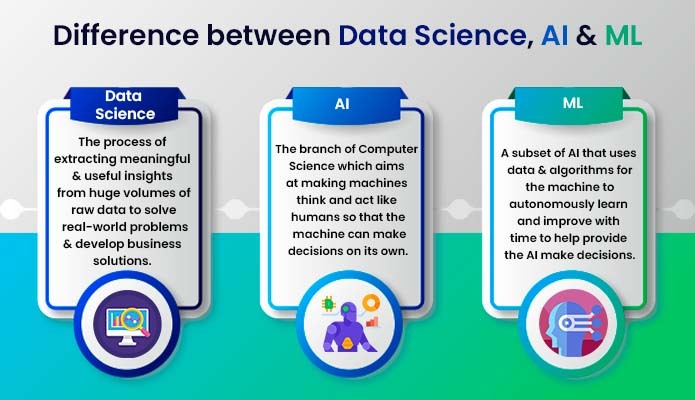
Before we go on a deep analysis of the differences between these three terms, let us first know about each of these three terms clearly to be able to understand the differences between them.
What is Data Science?
Data Science is a process in which huge volumes of raw data is analysed and processed to extract meaningful information to use for various research and business purposes. It is a long process that starts from collecting the raw data (both structured and unstructured).
This raw data is analysed and then processed using various tools and techniques. The aim as already stated is to get new results to solve real-world problems and business challenges with the help of the extracted useful insights.
The true foundation of Data Science lies not just in Computer Science but also in Statistics, Mathematics, and Business. AI and ML are two important tools that Data Science frequently uses to make predictive analysis.
What is Data Science Used For?
- Predictive Analytics- usually used in the retail sector to predict consumer behaviour or forecast demand to improve marketing.
- Social Research Processes- usually used in online questionnaires.
- Conversational Chatbots- usually used in online businesses to improve customer service.
- Recognition Technologies- voice, face, text recognitions to prevent frauds.
- Decision making systems- devices or systems that are able to automatically make necessary decisions like drones.
- Recommendation Technologies- like Youtube, Netflix, or Spotify recommends you things based on your past browsing behaviour.
- Healthcare- used in study of genetic issues using genomic data.
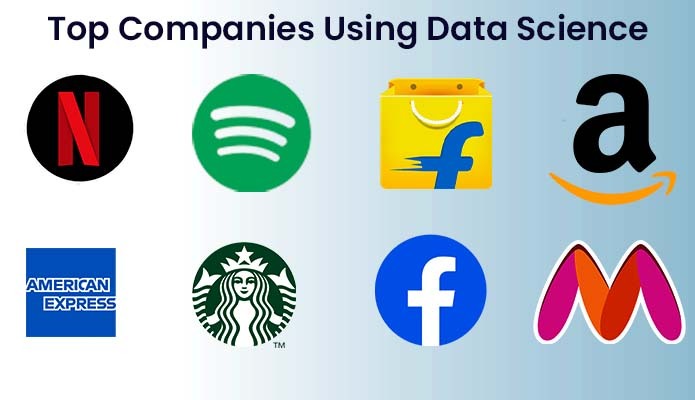
Among the applications of Data Science mentioned above, most of them are based on AI. So, let’s now talk about Artificial Intelligence and its applications.
What is Artificial Intelligence (AI)?
The idea of Artificial Intelligence came into being while answering the question- “Can machines think? How can we create an intelligent computer and what will the future look like with intelligent machines?”
Artificial Intelligence (AI) is one of the many disciplines of Computer Science. The aim of AI is to make machines think like humans do to make decisions based on the data provided to the machine.
AI has been growing exponentially in the past decade. It has already been touching our lives in ways that you might not notice. For example, every time you go on google search, some kind of AI is being used to show you the best results. Every time you ask Siri or Alexa a question, Natural Language Processing and Speech Recognition is being used. The best example of AI would be robots and self-driving cars.
So artificial intelligence will probably be one of the biggest scientific breakthroughs in the 21st century. It will give us the power to probe the universe and our humanity with a different approach. AI has the potential of forever changing our humanity.
What is Artificial Intelligence Used For?
- Natural Language Processing- usually used in translation tools like Google Translate.
- Robotics- used in motion planning and in making robots that can mimic human behaviour and intelligence as much as possible.
- Optimisation Technologies- for example, your GPS creating a route for you.
- Gaming Algorithms
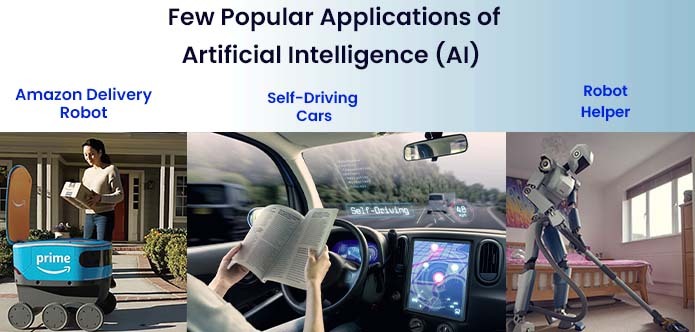
The backbone of AI is Machine Learning. So, let’s move on to understanding Machine Learning and how it works.
What is Machine Learning (ML)?
Machine learning is a self-explanatory term. We want to make machines learn based on the data stored in it and make decisions. It is a subset of AI.
Machine Learning can be understood in two major components. One is to use algorithms to find meaning in random and unordered data and the second part is to use learning algorithms to find relationships between that knowledge and improve the learning process.
The aim of Machine Learning (ML) is to keep learning to help the machine think and act like humans and autonomously improve learning with time. To put it simply, computers learn to program themselves with the help of machine learning. This is because you do not have to write the code. Instead, you just give data to the generic algorithm, which then based on this information builds its own logic. So, if programming is automation, then think of ML as double automation.

So the overall goal for ML is actually quite simple. It is to improve the machine’s performance on certain tasks like predicting the stock market or translating articles between languages so that the AI appliance can make better decisions.
Difference between Data Science, Artificial Intelligence (AI) & Machine Learning (ML)
Data Science focuses on collecting, managing, processing, and interpreting to draw insights from big data to perform decision making.
Artificial Intelligence and Machine Learning are two of the technologies used within Data Science to help in the decision making processes.
Machine learning develops algorithms to analyse data to learn from it to predict trends. AI uses this data and predictions for decision-making.
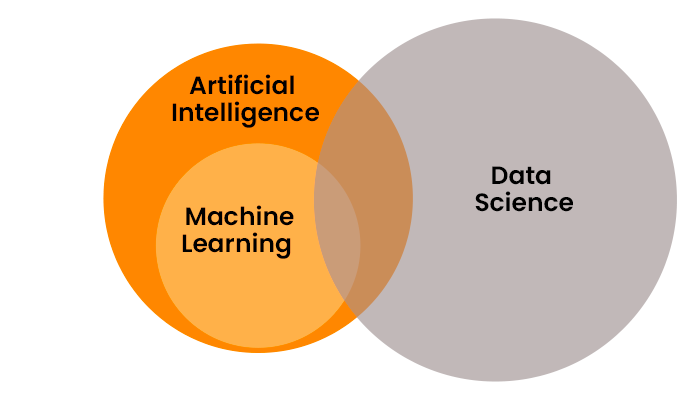
There are various parameters based on which Data Science, Artificial Intelligence, and Machine Learning can be differentiated.
| Differentiating Factors | Data Science | Artificial Intelligence | Machine Learning |
| Focus | Collect and analyse structured and unstructured data to extract meaning from it to solve problems and make business decisions and campaign planning. | Make the machine understand human perception and communication so that the machine can think and act just like the humans do, to enable decision-making and problem-solving. | Make the machines synthesize data and autonomously learn from it and improve with time to offer useful insights to the AI to perform decision-making tasks. |
| Applications |
|
|
|
| Job Roles |
|
|
|
| Average Salary Per Annum | ₹8,67,417/- | ₹8,13,892/- | ₹7,33,318/- |
| Skill Required |
|
|
|
| Courses |
|
|
|
| Online Colleges |
|
|
|
| Eligibility | The candidate must have a background in Computer Science as well as Mathematics and Statistics. | The candidate must have a background in Computer Science. | The candidate must have a background in Computer Science and Mathematics. |
How are Data Science, Artificial Intelligence (AI), and Machine Learning (ML) connected?
Data is the common denominator between data science, artificial intelligence, and machine learning. All the three fields we have been talking about are different from each other based on their applications but all of them are connected through DATA. It is important to know how these three fields work together to understand what we are going to discuss further in this blog.
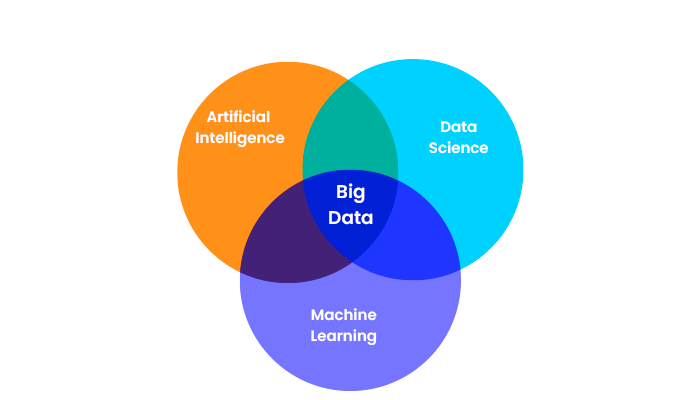
All three work on data to produce results.
Data Science as the name itself suggests is the science of collecting, understanding, analysing, and processing data to draw valuable insights that can be used to solve various real-world problems as well as can enhance existing business models.
Now, it is mostly Artificial Intelligence (AI) and Machine Learning (ML) tools and technologies that help Data Scientists draw these useful insights, make decisions, and use them effectively. The most common tech is Predictive Analytics where Machine Learning, Artificial Intelligence, and Data Science work closely together and produce impeccable results bringing good profits to businesses.
Let’s understand this with an easy example.
If you use any of these apps- Youtube, Netflix, Flipkart, or Spotify, then you must have noticed that these apps give you recommendations of videos, movies, products, or songs you may like. How do you think this happens?
Data Scientists collect the data from these apps like browsing history and then they feed this data into Machine Learning Algorithms that learns about the behaviour of each consumer based on this data. The AI application then makes decisions based on the learning of the ML algorithm and displays the best results to the consumer.
Careers in Data Science, Artificial Intelligence (AI), Machine Learning (ML)
By now, you must have understood the major differences between Data Science, Artificial Intelligence, and Machine Learning. Now let us look at some important factors in case you are thinking of a career in any of these three fields.
Future Scope In Data Science, AI & Machine Learning
You probably might be aware that Data Scientist has been considered as one of the coolest professions in the 21st century. The field has immense scope because of the exponential growth of big data everyday.
This sudden growth has left a huge gap between the demand and supply of data science professionals around the world. In India alone, there were over 90,000 open jobs in the analytics and data science field in 2020 according to a report by Analytics India Magazine (AIM).
This alone explains the great scope of a career in data science. Due to the increasing digitisation and the wide application of data science, industries are in dire need of experienced data science professionals.
Now let us talk about Artificial Intelligence (AI) and Machine Learning (ML). So, as described above, Data Science, AI, and ML are connected in some way. In fact, the most important application of AI and ML is in the field of Data Science. Even Data Science is considered to rely the most on AI and ML as more than half of their applications and areas of focus are related to AI and ML.
That being said, maximum jobs in the field of Data Science are for AI and ML professionals. However, AI and ML is not just used in the Data Science field, but in other important and dynamic fields as well like Robotics and Cyber Security. All these fields are some highly advanced and technical ones and so the jobs are quite lucrative.
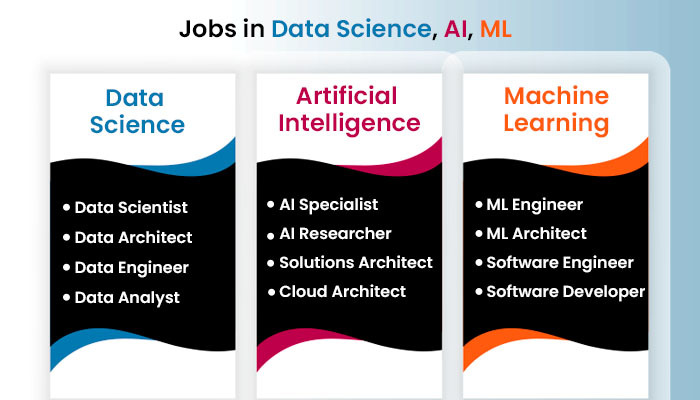
The Data Science, Artificial Intelligence, and Machine Learning industries are still developing and evolving with new technologies, trends, researches, and applications emerging every day.
Therefore, a career in any of these fields guarantees longevity and security. This is because these jobs are going nowhere as long as there is data in the world, which is the same as saying as long as there are humans on earth. So you can be rest assured. Also Read | Highest Paying Jobs In the World!
However, the need is of expert and experienced professionals. That means, if you wish to pursue a career in any of these fields then you need to study these subjects in-depth.
Take a look at how you can do so.
Courses and Colleges for Data Science, AI & ML
Data Science, Artificial Intelligence, and Machine Learning are all small and distinct branches of Computer Science. In India, Computer Science is taught as a subject altogether giving an overview of all the branches and sub-domains within Computer Science.
For instance, the prestigious B.Tech degree is offered for Computer Science and not for AI or Data Science or any other branches like Cyber Security course. However, to become an expert in these domains, you will need in-depth knowledge of these subjects.
To cater to this problem, some colleges have come up with courses dedicated to these subjects to give in-depth knowledge of a particular subject/domain. These courses are in the online mode which gives an additional advantage of flexibility and affordability to the learners.
These colleges offer online degree computer courses of various types like-
- Undergraduate Degree Courses (BCA, B.Sc)
- Postgraduate Degree Courses (MCA, M.Sc)
- Professional Certificate Courses
- Diploma Courses
- Postgraduate Diploma (PGDM) courses
- B.Tech and M.Tech for Working Professionals
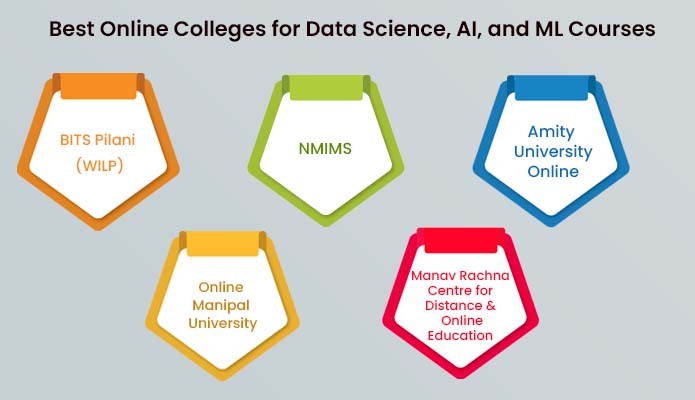
Why Online Courses?
You must be wondering what is the need for these online computer courses as there were Data Science, AI & ML professionals even before these online courses came into being. You are right, these professionals were there and they must have opted for the traditional Computer Science degree courses.
However, these professionals had to gain years of experience in the IT industry to get to the specialised positions in Data Science or Artificial Intelligence departments. This is because these domains are highly technical and advanced and need in-depth knowledge of the subject.
So, those who have not studied these disciplines have to work hard and gain experience by learning and working under domain specialists.
Then after 7-8 years, they can get to good positions in their specific departments. However, those who study these specific disciplines in detail can cut down on the years of experience they will need to get to good positions. This means, such candidates can get to good positions with just 3-4 years of experience in their domain.
What is the advantage of Online Courses?
- Flexibility- You do not have to go to college, you can attend classes from home and at flexible timings. This can save a lot of your time so you can either enhance your practical skills by regularly practising or you can even opt for a job simultaneously. Online courses are a really helpful asset to working professionals who wish to upskill themselves.
- Affordable- Since the courses are completely online, the fee is much less than the regular offline courses. You do not have to travel to the college everyday or relocate to the city where the college is.
- Dual Degree- If you are skeptical of whether to pursue a discipline-specific online course or not, then you have the option of pursuing two degrees at the same time. So, you can opt for one regular offline degree and one online course in Data Science programs online or AI online programs or ML online programs. You can even opt for both the degree courses in the online mode as well according to the latest guideline of UGC.
So, now if you are looking for which online course you must go for, then College Vidya can help you choose the right online course and most importantly the right online university for your career. At College Vidya you will find only UGC approved online universities offering the course of your choice. You can compare various universities in just 2 minutes and then select the one that suits your requirements. Our certified counsellors are also available for text/audio/video consultations in case you need professional guidance on your career path through online courses.
Trending Articles
|
|
|
|
|
|
|
|
|
|
|
|
|
|
|
|
|
|
|
|
|
|
|
|
|
|
|
|
|
|
|
|
|

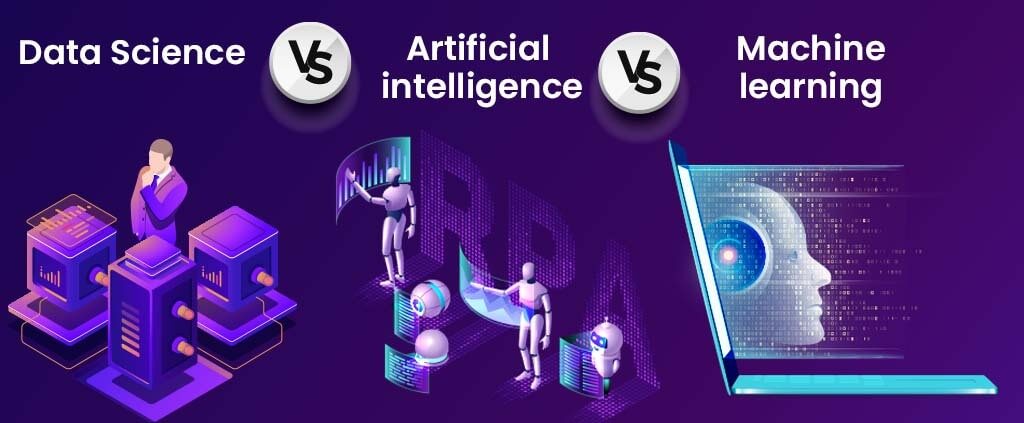





![What Is the Scope of Data Science In India? [Latest 2026]](https://d1aeya7jd2fyco.cloudfront.net/blog/what-is-the-scope-of-data-science-in-india.webp)
![How To Become A Data Scientist [A Complete Guide 2026]](https://d1aeya7jd2fyco.cloudfront.net/blog/how-to-become-a-data-scientist-comprehensive-guide.webp)








